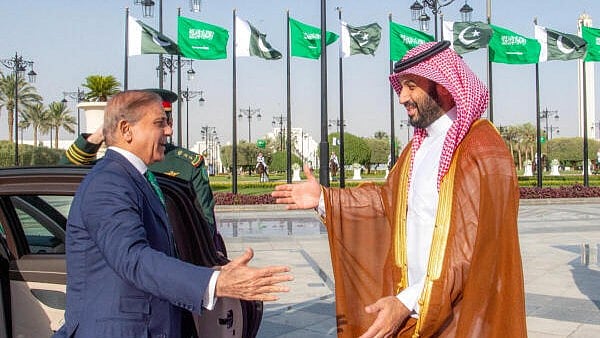
Saudi Crown Prince Mohammed bin Salman and Pakistan Prime Minister Shehbaz Sharif sign a defence agreement in Riyadh
Credit: Reuters Photo
New Delhi: Riyadh has disregarded the personal rapport between Prime Minister Narendra Modi and Crown Prince Mohammed bin Salman Al Saud and overlooked New Delhi’s security concerns to enter into a defence agreement with Islamabad, committing Saudi Arabia to help Pakistan respond to any aggression by a third country.
Crown Prince Mohammed bin Salman, the de facto ruler of Saudi Arabia, hosted Prime Minister Shehbaz Sharif in Riyadh on Wednesday.
They signed a Strategic Mutual Defence Agreement, which stipulated that Saudi Arabia and Pakistan would consider any external aggression against either country as an aggression against both, necessitating a joint response.
The Riyadh-Islamabad deal came just about four months after the India-Pakistan cross-border military flare-up between May 7 and 10. The Modi Government in New Delhi played it down, stating that the agreement between Pakistan and Saudi Arabia had just formalised a long-standing understanding between the two nations. India was aware that such an agreement between Pakistan and Saudi Arabia had been “under consideration”, Randhir Jaiswal, the spokesperson of the Ministry of External Affairs in New Delhi, said.
Saudi Arabia’s pledge to help Pakistan respond to any external aggression, however, prompted New Delhi to study the implications of the agreement for the national security of India, as well as for regional and global stability. The government remains committed to protecting India’s national interests and ensuring comprehensive national security in all domains,” the MEA spokesperson said on Thursday.
Modi had been on a tour to Jeddah on April 22 when a gang of terrorists from Pakistan and areas under illegal occupation of Pakistan had killed 26 people – mostly tourists – at Baisaran near Pahalgam in Jammu and Kashmir of India. He had met MBS – the de facto ruler of Saudi Arabia – in the evening before cutting short his visit and returning to New Delhi. MBS had joined Modi in condemning the gruesome terrorist attack in J&K.
Though the relations between India and Saudi Arabia had been elevated to a strategic partnership in 2010, the personal rapport between Modi and MBS had played a key role in strengthening the bilateral ties over the past few years. In a statement issued before departing New Delhi for Jeddah early on April 22, Modi had referred to MBS as his “brother”. “Every time I have met him, His Royal Highness (MBS) has left a deep impression on me,” the prime minister had also told Arab News in an interview. “I value the personal warmth and trust we share. And, yes, this personal rapport has naturally translated into how both countries give priority to our partnership.”
Notwithstanding the personal rapport between the two leaders, Riyadh disregarded New Delhi’s sensitivities and entered into the Strategic Mutual Defence Agreement with Islamabad, on the 75th birthday of Modi. The agreement will allow Saudi Arabia to use the nuclear arsenal of Pakistan as an insurance for itself, in addition to helping the kingdom project its power in the changing geopolitics. “The pact showcases Saudi Arabia’s willingness to weaponise Pakistan’s weakness to project its own influence,” Brahma Chellaney, an eminent commentator on geostrategy, posted on X after the agreement between Riyadh and Islamabad came to the public domain.
After President Donald Trump of the United States and President Xi Jinping of China, Riyadh too rolled out the red carpet, not only for the prime minister of Pakistan, but also for Field Marshal Asim Munir, the chief of the South Asian nation’s army, whom New Delhi had accused of provoking the April 22 carnage in J&K with an incendiary hate speech.
